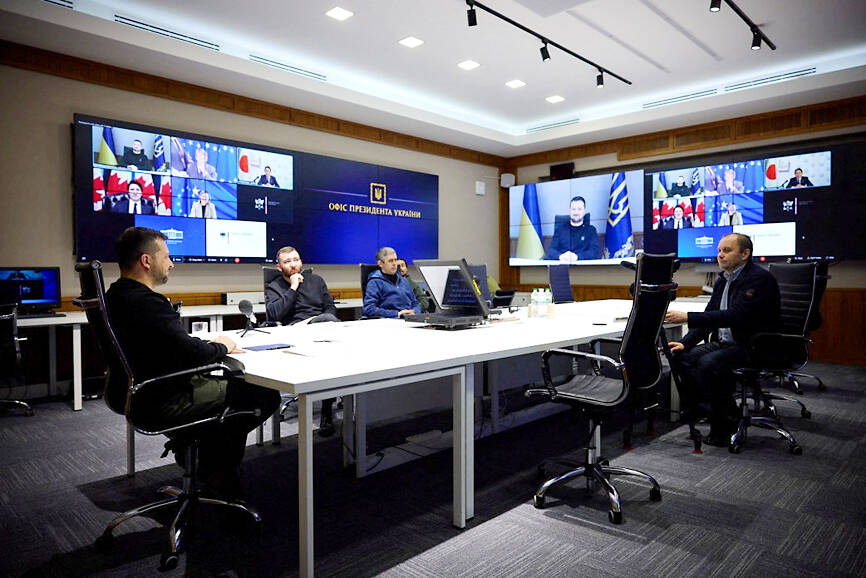Leaders of the G7 in an online meeting on Wednesday underlined the importance of peace and stability in the Taiwan Strait.
G7 leaders, along with Ukrainian President Volodymyr Zelenskiy, met online to address global challenges, including Russia’s invasion of Ukraine and Hamas’ attack on Israel, as well as issues such as economic resilience, food security and health.
“We reaffirm the importance of peace and stability across the Taiwan Strait as indispensable to security and prosperity in the international community,” the body said in a statement.

Photo: Ukrainian Presidential Press Service handout via Reuters
The leaders called for “a peaceful resolution” to cross-strait issues, adding that “there is no change in the basic positions of the G7 members on Taiwan, including stated one China policies.”
Regarding the Indo-Pacific region, they voiced serious concerns about the situation in the East and South China seas, underlining that they “strongly oppose any unilateral attempts to change the status quo by force or coercion.”
They also reiterated the commitment to a free and open Indo-Pacific that is “inclusive, prosperous, secure and based on the rule of law, and that protects shared principles.”
While being open to building “constructive and stable relations with China,” G7 countries urged Beijing to play by international rules, adding that they are to work toward derisking and diversifying to build resilient economies.
The leaders also called on Beijing to honor its obligations under the Vienna Convention on Diplomatic Relations and the Vienna Convention on Consular Relations to refrain from engaging in “interference activities aimed at undermining the security and safety of our communities, the integrity of our democratic institutions and our economic prosperity,” the statement said.
China’s expansive maritime claims in the South China Sea have “no legal basis,” they said, adding that they are opposed to its “militarization activities” in the region.
In Taipei, the Ministry of Foreign Affairs in a statement yesterday thanked the G7 countries for their continued concern about the situation in the Taiwan Strait.
Major countries have repeatedly stressed the importance of peace and stability in the Taiwan Strait, including at the G7 summit in Hiroshima, Japan, in May and the summit between the leaders of Japan, South Korea and the US at Camp David in Maryland in August, the ministry said, adding that the issue has become a consensus in international society.
In other news, Taiwan is to donate US$2 million to the Western Central Pacific Fisheries Commission over five years starting next year to assist in the development of small island nations, the ministry said.
Taiwan made the announcement at the commission’s annual meeting, which began in the Cook Islands on Monday and concludes today, Department of International Organizations Deputy Director-General Lee Kuan-te (李冠德) told a regular news briefing.
The donation is to follow a five-year project from 2017, in which Taiwan donated US$2 million to the commission to establish a trust fund to assist members of the Small Island Developing States, including Taiwan’s diplomatic allies in the Pacific, to build fishery capabilities, Lee said.

The CIA has a message for Chinese government officials worried about their place in Chinese President Xi Jinping’s (習近平) government: Come work with us. The agency released two Mandarin-language videos on social media on Thursday inviting disgruntled officials to contact the CIA. The recruitment videos posted on YouTube and X racked up more than 5 million views combined in their first day. The outreach comes as CIA Director John Ratcliffe has vowed to boost the agency’s use of intelligence from human sources and its focus on China, which has recently targeted US officials with its own espionage operations. The videos are “aimed at

STEADFAST FRIEND: The bills encourage increased Taiwan-US engagement and address China’s distortion of UN Resolution 2758 to isolate Taiwan internationally The Presidential Office yesterday thanked the US House of Representatives for unanimously passing two Taiwan-related bills highlighting its solid support for Taiwan’s democracy and global participation, and for deepening bilateral relations. One of the bills, the Taiwan Assurance Implementation Act, requires the US Department of State to periodically review its guidelines for engagement with Taiwan, and report to the US Congress on the guidelines and plans to lift self-imposed limitations on US-Taiwan engagement. The other bill is the Taiwan International Solidarity Act, which clarifies that UN Resolution 2758 does not address the issue of the representation of Taiwan or its people in

DEFENDING DEMOCRACY: Taiwan shares the same values as those that fought in WWII, and nations must unite to halt the expansion of a new authoritarian bloc, Lai said The government yesterday held a commemoration ceremony for Victory in Europe (V-E) Day, joining the rest of the world for the first time to mark the anniversary of the end of World War II in Europe. Taiwan honoring V-E Day signifies “our growing connections with the international community,” President William Lai (賴清德) said at a reception in Taipei on the 80th anniversary of V-E Day. One of the major lessons of World War II is that “authoritarianism and aggression lead only to slaughter, tragedy and greater inequality,” Lai said. Even more importantly, the war also taught people that “those who cherish peace cannot

US Indo-Pacific Commander Admiral Samuel Paparo on Friday expressed concern over the rate at which China is diversifying its military exercises, the Financial Times (FT) reported on Saturday. “The rates of change on the depth and breadth of their exercises is the one non-linear effect that I’ve seen in the last year that wakes me up at night or keeps me up at night,” Paparo was quoted by FT as saying while attending the annual Sedona Forum at the McCain Institute in Arizona. Paparo also expressed concern over the speed with which China was expanding its military. While the US